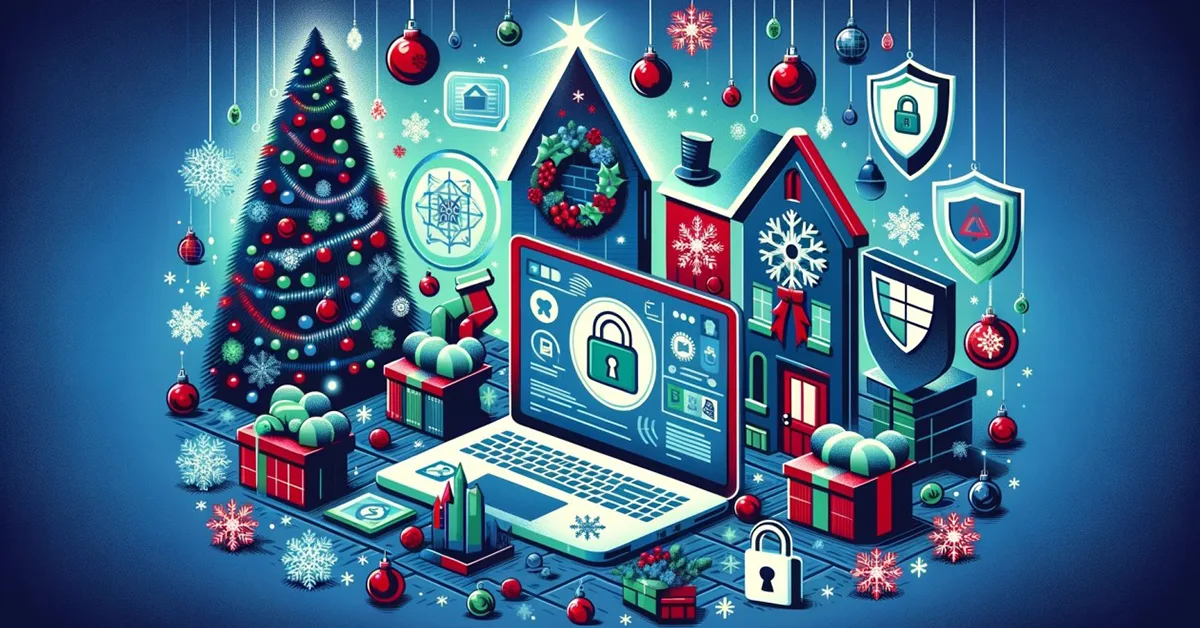
The holiday season is upon us! While the season offers increased sales for many small businesses, it also marks a period of heightened risk for cybersecurity attacks. With the surge in online shopping, remote work, and holiday distractions, cybercriminals see this time as an opportune moment to launch targeted attacks. As we enter the busiest shopping season of the year, small businesses must be aware of the rising threats and take proactive steps to protect their systems and sensitive data.
Increased Risks During the Holiday Season
Cybercriminals are well aware of the holiday rush and take full advantage of it. Recent statistics from 2023 highlight a disturbing trend: holiday-season cyberattacks are not only increasing in number but also in sophistication. A report by Check Point Research found that global weekly cyberattacks increased by 40% in the last quarter of 2023 compared to the rest of the year. (1) They attributed several factors, including increased online transactions, seasonal promotions, and employees being more likely to fall for phishing scams due to holiday distractions.
Additionally, the FBI and CISA have issued warnings specifically about holiday-themed phishing campaigns, where cybercriminals impersonate popular brands or send fake order confirmation emails to trick recipients into clicking malicious links . For small businesses, which often have fewer resources to combat these threats, the risk is especially high. (2)
Top 3 Tips To Stay Safe During Increased Cyber Threats
Given the elevated risks during the holiday season, small businesses must take specific measures to bolster their cybersecurity defenses. Here are the top three strategies to help you stay protected:
1. Educate Employees on Phishing Scams
Phishing remains one of the most common methods cybercriminals use to gain unauthorized access to sensitive information. During the holidays, phishing attempts become even more prevalent, often disguised as festive promotions, charity donation requests, or fake delivery notifications. According to Verizon’s 2024 Data Breach Investigations Report, 74% of all data breaches involved a human element, such as an employee falling for a phishing email. (3)
To mitigate threats, small businesses should conduct refresher training sessions for employees, specifically focusing on recognizing phishing emails. Employees should be taught to scrutinize sender addresses, avoid clicking on suspicious links, and verify the legitimacy of emails, especially those that seem urgent or too good to be true. Implementing a simple verification process, such as double-checking unexpected emails with a colleague or supervisor, can significantly reduce the chances of a successful phishing attack.
2. Enable Multi-Factor Authentication (MFA) Across All Accounts
One of the most effective ways to protect against unauthorized access is by enabling multi-factor authentication (MFA). MFA adds an extra layer of security by requiring users to provide two or more verification factors to access an account. Even if a cybercriminal obtains a user’s password, they will still need the second factor—such as a code sent to a phone or an authentication app—to gain access.
According to Microsoft, MFA can prevent up to 99.9% of automated attacks . This statistic underscores the importance of implementing MFA, especially during periods when the risk of account compromise is higher. Small businesses should prioritize enabling MFA on all critical systems, including email accounts, financial software, and customer management platforms. Additionally, educating employees on the importance of using unique, strong passwords alongside MFA can further enhance security. (4)
3. Update and Patch Software Regularly
During the holiday season, many businesses focus on sales and customer engagement, often neglecting regular maintenance tasks like software updates. However, failing to update software and apply patches can leave systems vulnerable to known exploits. Cybercriminals are adept at scanning for outdated software to exploit security vulnerabilities, and holiday distractions can make businesses more susceptible.
In fact, a recent study by Sophos highlighted that 54% of businesses that fell victim to ransomware attacks in 2023 had not applied available patches to their systems . To avoid this pitfall, small businesses should implement a regular update schedule, ensuring that all operating systems, applications, and plugins are up to date. Using automated patch management tools can help streamline this process, reducing the risk of human error and ensuring that critical updates are applied promptly. (5)
Conclusion
The holiday season is a critical time for small businesses, offering opportunities for increased sales but also presenting heightened cybersecurity risks. Cybercriminals are aware of the seasonal surge in online activity and often ramp up their efforts to exploit vulnerabilities during this period. By staying vigilant and taking proactive measures – such as educating employees on phishing scams, enabling multi-factor authentication, and keeping software updated – small businesses can significantly reduce their risk of falling victim to cyberattacks.
Dynamic Edge Can Help
Since 1999, Dynamic Edge has helped hundreds of small and mid-sized businesses maximize the return on their technology investment. Contact us today for a free network assessment, so that we may help you implement cost-effective security solutions to keep your organization and its clients safe and productive. Our Help Desk features friendly, experienced engineers who answer calls live and solve more than 70% of issues on the first call.
- https://blog.checkpoint.com/research/november-shopping-schemes-check-point-research-unveiling-cybercriminal-tactics-as-luxury-brands-become-pawns-in-email-scams/
- https://www.cisa.gov/news-events/cybersecurity-advisories
- https://www.verizon.com/business/resources/reports/2024-dbir-data-breach-investigations-report.pdf
- https://learn.microsoft.com/en-us/partner-center/security/security-at-your-organization
- https://www.sophos.com/en-us/content/state-of-ransomware


